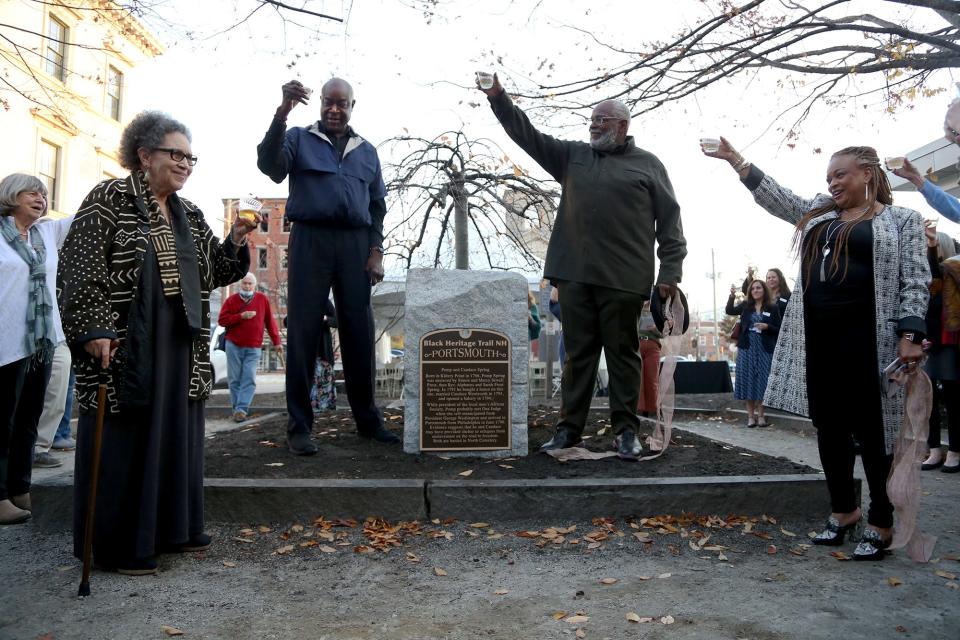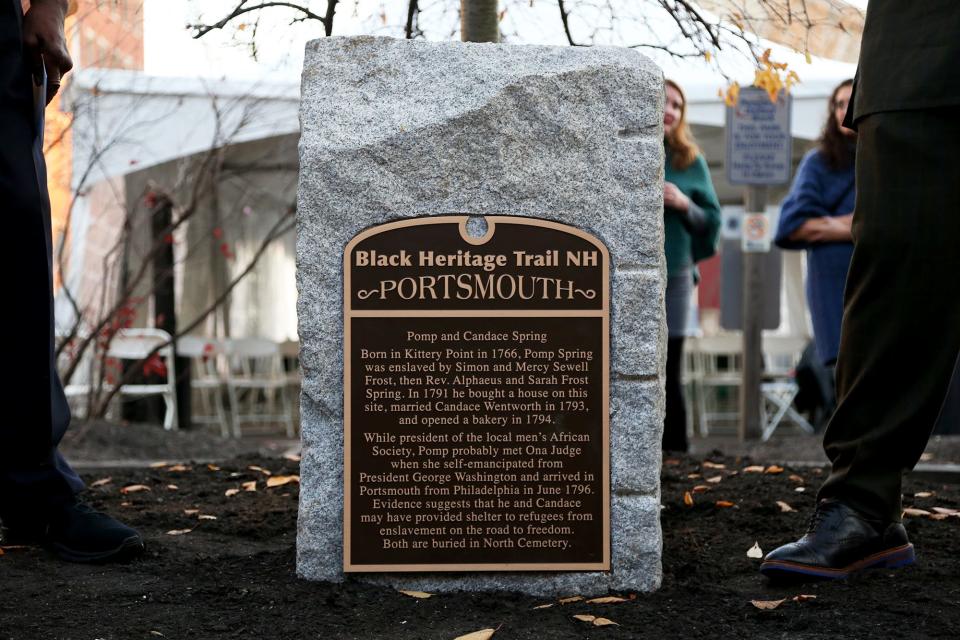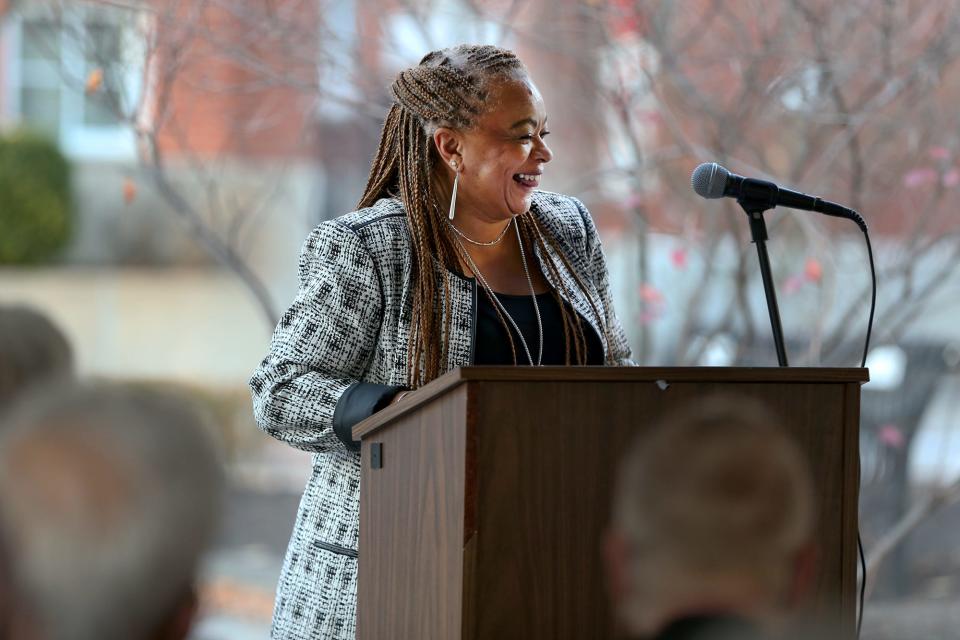'Include us': Black Heritage Trail honors Pomp and Candace Spring in Portsmouth history
PORTSMOUTH — Celebratory beverages were held high in the air near the intersection of Church and Porter streets Thursday in a toast to a once-enslaved African-American couple who lived in the city between 1791 and 1807.
The Black Heritage Trail of New Hampshire unveiled a new marker honoring Pomp and Candace Spring and their ties to the region's history.
“That’s what these markers do,” said JerriAnne Boggis, executive director of the nonprofit Black Heritage Trail, which has unveiled three historic markers in 2021. “They include us in a story that we have often been erased from and gives that place for that dialogue, for us to talk about what it means, what this history means, and how it changes the perception of African-Americans and people who lived here in New England in a state that is often called one of the whitest states in the Union.”
Affordable housing at Community Campus?: Portsmouth Housing director would be 'delighted'

Historian Valerie Cunningham helped unveil the marker across the street from where the Springs lived on property that is now owned by adjacent People’s United Bank. Cunningham was credited by Boggis and other speakers for researching the history of the Springs and their time in Portsmouth.
What we know about Pomp and Candace Spring
According to Cunningham and local historian J. Dennis Robinson, the Springs’ story goes as follows: Pomp, whose true name is unknown, was born in 1766 in Kittery Point to a woman named Phyllis, who was enslaved by Simon and Mercy Sewell Frost.

At an unknown date later on, Pomp moved in with the Rev. Alpheus Spring and his family in Kittery, though that area is now Eliot, Maine. Rev. Spring died in 1791 and afterward, Pomp moved to Portsmouth, where he bought a home at the corner of Porter Street and Church streets for $475. In 1792, he spent $300 to expand the lot and purchase the bake shop next door.
Previous story: Pomp and Candace Spring invisible no more thanks to Black Heritage Trail
The next year, Pomp married Candace Wentworth, who was enslaved to the Wentworth family in Somersworth. In 1794, they opened their bakery, which was how they made their living.
In a history of the couple, Robinson wrote, “In defiance of boilerplate history, Pomp and Candace did not live in an attic or backyard slave quarters. The freed couple owned a comfortable home and operated their once-famous bakery next to Rev. Buckminster’s church. A mid-20th century photograph shows their house tucked up against the back brick wall of the former Colonial Theater, later Sessions Music, now 18 Congress St. A row of townhouses and a bank parking lot on Porter Street occupy the site today.”
Longtime Trail volunteer Angela Matthews, recognized earlier this year by the New England Patriots for her volunteer efforts with the nonprofit, said the Springs’ marker helps form a “constellation” of some of the city’s recognized Black history.
In Portsmouth: Pannaway Manor qualifies for I-95 sound barriers. New Franklin left out.
Matthews said the Springs' marker is connected to the city's African Burying Ground to the west, the Trail’s Court Street offices to the south and the rising sun to the east.
The marker notes Pomp Spring was the president of a local men’s African society. It also says it’s likely that when Ona Judge, a self-emancipated slave of President George Washington and Martha Washington, arrived in Portsmouth from Philadelphia in June of 1796, Pomp Spring was the one who met her.
Boggis: To honor Ona Marie Judge Stains, use her proper name
The Springs lived their final years in Portsmouth before both dying in 1807. Both are buried in North Cemetery.
Boggis said the Springs’ will suggests possible involvement in the Underground Railroad, as she cited their “unusual amount of chairs, eating utensils, bedding and trunks of clothes for a family of two, husband and wife.”
“That was unusual. And that’s how we came to think that Ona probably stayed with them when she first (arrived),” Boggis said.

In Portsmouth alone, Boggis said there are 26 Black Heritage Trail markers. Next year, plans call for the trail to unveil five new markers around New Hampshire.
Prior to performing a rendition of “Battle Hymn of the Republic" at Thursday's event, the Rev. Bob Thompson pointed to the investigative work of Cunningham, who helped establish the city’s Black Heritage Trail in 1995, in helping unearth the stories of Portsmouth’s Black history.
'This may be the wrong spot': Portsmouth micro-unit plan can't move forward as planned
Addressing the crowd, Thompson said, “When your young children feel like they don’t want to do anything because they’re just by themselves, remind them of what an individual can accomplish just by asking questions.”
This article originally appeared on Portsmouth Herald: Portsmouth's Black Heritage Trail honors once-enslaved Black couple

